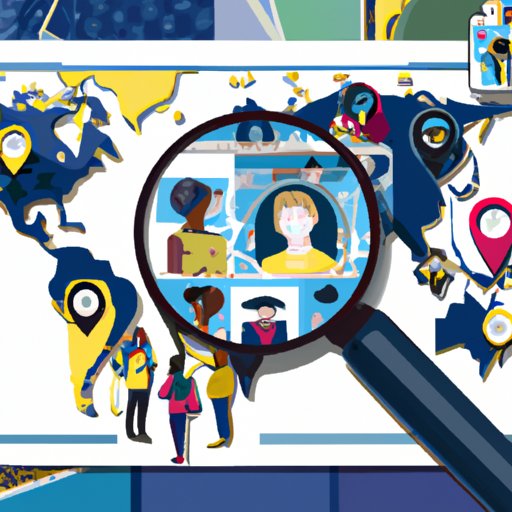Introduction
Have you ever lost touch with someone and found yourself wondering where they are now? Whether it’s an old friend, a family member, or a long-lost love, locating an individual can seem like a daunting task. But fear not, with the advent of technology and the internet, finding people is easier now than ever before.
Use Social Media
Social media has revolutionized how we look for people. With millions of people using platforms like Facebook, Twitter, and Instagram every day, there’s a good chance that the person you’re trying to find has a social media account. Using social media platforms can help you locate someone quickly and easily.
To start, visit the social media platform of your choice and enter the person’s name in the search bar. You may need to filter your search results by city, school, or workplace to minimize irrelevant results. If you’re not sure which account belongs to them, take a look at the profile pictures or cover photos to see if any look familiar. You can also narrow the search by looking for mutual friends or following the person’s comments or likes.
It’s important to note that not everyone has a social media account, so don’t fret if you don’t find what you’re looking for right away.
Online People Search Engines
Online people search engines such as Pipl or PeekYou can also be used to find someone. These specialized search engines can help you locate individuals by searching across multiple platforms, including social media, public records, and other sources.
To start, enter the person’s name into the search bar and wait for the search engine to generate results. Here too, you may need to filter your search by age, city, or state. You can also use advanced filters to specify criteria such as education, interests, or social media platforms.
It’s recommended that you exercise caution when using online search engines as they may provide sensitive information such as addresses, phone numbers, or employment histories. Make sure to verify the accuracy of the information before taking any action.
Public Records
Public records databases can be accessed for free and can provide valuable information on an individual’s personal and professional history. These databases include court records, police records, and property records.
To access public records, you will need to visit relevant government websites or visit the physical location in person. You may also need to provide personal information to verify your identity.
It’s important to note that some records may be restricted, sealed, or unavailable due to privacy concerns or legal limitations. Public records should be used responsibly and only for legitimate purposes.
Hire a Private Investigator
In some cases, hiring a private investigator may be the most effective way of finding someone. A private investigator can use specialized resources and knowledge to assist in your search.
It’s important to exercise caution when hiring a private investigator and ensure that they are reputable and licensed. Research their credentials, read reviews, and ask for referrals from people who have used their services before. Additionally, cost considerations should be taken into account before hiring a private investigator as their services can be expensive.
Contact Mutual Friends or Relatives
If you’re trying to locate someone, reaching out to mutual friends or relatives can be a great place to start. They may have information on the person’s whereabouts or be able to provide valuable context that can aid in your search.
When reaching out to mutual friends or relatives, be tactful and respectful in your approach. Explain your reasons for looking for the person and ask if they would be willing to provide any information or offer any assistance. It’s important to understand that some individuals may prefer to remain anonymous or may not want to be found.
Use Public Resources
Local public resources such as library archives, local newspapers, or town halls can also be useful in locating someone. These resources can provide valuable information on an individual’s history or help you find people with similar interests or backgrounds.
When using public resources, be prepared to spend time researching and be patient if you don’t find the information you’re looking for right away. Additionally, some resources may have restrictions on access, so make sure to check before visiting or using them.
Go To Their Last Known Location
If you’re having trouble finding someone and have tried other methods, it may be worth visiting their last known location. This could be a city, a neighborhood, a workplace, or a school. Alternatively, you could try visiting places that the person may frequent, such as a favorite coffee shop or park.
It’s important to exercise caution and respect when approaching the situation. Be polite and explain your reasons for looking for the person. It’s important to understand that some individuals may feel uncomfortable or threatened by your approach.
Conclusion
Finding someone can be an overwhelming task, especially if you have limited information. However, with the use of social media, online people search engines, public records, and other resources, finding someone has become easier than ever before.
Remember to use these resources responsibly and respect the privacy of the person you’re trying to locate. While it may take time and effort to find someone, the reward of reconnecting with a loved one or friend can be well worth it.
Additional Resources and Support
If you’re struggling with finding someone, there are a variety of resources and support available. These include local law enforcement agencies, private investigators, and online support groups. Remember, you don’t have to go through this alone.
